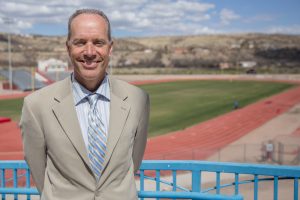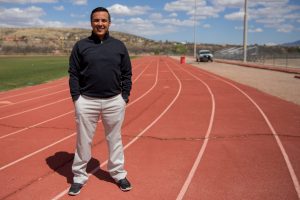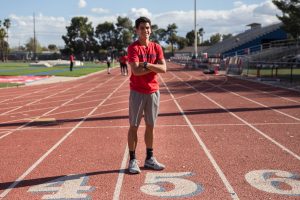- Slug: BC-CNS-Rio Rico Athletes, 1,850 words.
- Photos and captions below.
- Video here.
By RYAN CLARKE
Cronkite News
RIO RICO – This is one of those small towns that’s easy to miss. It is hidden amid a thicket of green brush, saguaros and rocky knolls off Interstate 19, just north of the U.S.-Mexico border and east of a national wildlife refuge that remains a busy corridor for migrants and drugs.
Rio Rico seems sleepy at first glance. None of the imagery of a dangerous, lawless border town applies here. Traveling on its winding back roads, you can hear the laughter of schoolchildren playing at recess. Family-owned restaurants, diners and supermarkets sit on the edge of quiet neighborhoods.
The town of 19,000 residents has one high school. Nearly all its 1,100 students either were born in Mexico or have parents who were born in Mexico, but that’s not its main point of distinction. Rio Rico High has nine state championships in cross country and track and field since 2000 and 86 individual gold medals in state competition.
The achievement is so impressive that opposing coaches often ask what’s in the water the Rio Rico Hawks drink.
Stephen Schadler laughs at the question. A former collegiate runner at Stanford University, he’s the head track and field coach at Rio Rico and assistant superintendent of the school district. A coach’s job in these parts involves tuning out the noise, especially these days, when so much of the discussion about the border tells only one side of its story. A lot of people don’t know what it’s like to live in a border town, so their perspectives – of the place and the students and what they’re capable of, Schadler said – often are shaped by the warped political discussion surrounding immigration.
“We’re fighting a lot of false impressions,” he said. “The intense vitriol that’s directed at public schools and second-language learners, and the insistence that kids aren’t learning when we know that they are.”
What a visitor finds among administrators, teachers and members of the athletic program is an infectious optimism that has been the school’s hallmark since its opening in 1996, and a determination to turn sports into a ticket to the world for students whose worlds are often confined to the borderlands. In 22 years, more than 50 Rio Rico High graduates have played sports at the collegiate level, many receiving partial or full scholarships to universities as far away as Florida and as close as Tucson, according to the school.
The numbers might seem ordinary for a big-name school in a wealthy suburb. But here, where the track has deep, jagged cracks and many parents don’t know about the college application process, the numbers are a big source of pride.
“When a student reaches a goal, the whole community celebrates,” Schadler said. “It’s very special.”
Two of the most prominent Rio Rico alumni to reach their goals in recent years are Oscar Amaya and Carlos Villarreal – best friends with inverse backstories.
Amaya was born in the nearby city of Nogales, Arizona, and spent his childhood in Nogales, Mexico, on the other side of the tall steel fence that divides two countries. Villarreal was born in Puerto Peñasco, a coastal city an hour south of the border, and came to Sahuarita, a town just north of Rio Rico, when he was 6.
They both spoke Spanish as their first language when they entered school in the United States. Amaya didn’t enroll until seventh grade, when he left his parents in Mexico and moved in with his aunt in Rio Rico, a common path for children who are U.S. citizens whose parents don’t have permission to live in the U.S.
Through second-language programs and team sports, he steadily adjusted. It helped that, as a U.S. citizen, he could cross the border to visit his parents whenever he wanted. It also helped that, in Rio Rico, the official language is “Spanglish” – a mix of English and Spanish – because most families speak it at home.
“It’s a community that was kind of isolated from the real world,” Villarreal said. “You could get around without speaking a lick of English.”
Amaya, who’s a junior at Arizona State University, will compete next season for the Sun Devils’ track and field team. Villarreal is a redshirt sophomore at University of Arizona, meaning that he’s an academic junior in his second year of athletics. He recently ran a mile in under four minutes (twice) during the 2018 indoor season and based on his recent performances, is on his way to becoming one of the best distance runners in the Pac-12 Conference.
Villareal, stretching before track practice at Roy P. Drachman Stadium in Tucson, a smooth oval in the athletic complex south of campus, has no trace of an accent and said many people “don’t know that Spanish was actually my first language. And then I speak Spanish, and they’re like, ‘Whoa.’”
Rio rico means “rich river” in Spanish. The town’s early history paints a picture of a settlement in constant flux. Long before a Florida real estate company dubbed the settlement Rio Rico in the 1960s, Father Eusebio Francisco Kino, a Jesuit priest who founded Catholic missions in the Sonoran Desert in the late 17th century and helped natives improve their agricultural practices, had called it Calabazas, Spanish for “pumpkins.”
Violence and disease ravaged the Santa Cruz Valley through much of the 18th and 19th centuries. It wasn’t until the 1970s – after decades of controversial and illegal land sales – that the proverbial dust settled and Rio Rico began to grow organically.
The town remains relatively unknown to most outsiders, though. People here and around the borderlands often refer to the place where they live as a separate country – not quite Mexico, not quite the United States. Schadler said the border checkpoint north of Rio Rico, a flashpoint for political controversy, only reinforces that idea.
But he feels his and his colleagues’ job is to shed a light on the town’s potential. Rio Rico sits at the convergence of the Santa Cruz River and Sonoita Creek, living up to its name with a palpable richness in natural beauty and tradition. The values of the people who live here – those seeking a realization of Rio Rico’s potential – carry young people like Amaya and Villarreal upstream to new experiences.
Whether they return home doesn’t matter, Schadler said, as long as they act as ambassadors for their community.
Amaya, sitting at a coffee shop near the ASU campus in Tempe, said Rio Rico isn’t “a bad town,” it’s “just something small.” For now, at least, his future lies elsewhere.
“I want to achieve something bigger and go to different places,” he said.
Jonathan Chavez came back eventually. A 1999 graduate of Rio Rico High, he’s now its athletic director. His brother, Eric, is one of the most decorated runners in school history, winning 14 gold medals before earning a scholarship to University of Arizona. Jonathan competed at Pima Community College before transferring to William Penn University in Iowa.
Chavez’s father is from Mexico and worked in the produce industry, a common experience for parents in Rio Rico and one that connects him to many of the students he directs. It’s his and Schadler’s job to build off what those students learned at home and help them build their wings.
“There are traditions and beliefs in the Mexican culture that are still very prevalent in what we do,” Chavez said. “That shows itself on the field.”
At a recent softball game, Chavez said the Hawks celebrated a girl’s birthday by playing “banda” – a boisterous musical style that originates in the Mexican state of Sinaloa and blends brass ensembles with percussion – over the loudspeakers. It caught the opposing team a bit off guard.
At a Rio Rico baseball game, you can hear parents, players and coaches yelling instructions and words of encouragement in Spanish:
Buen trabajo!
Vamos! Vamos!
Anda ya!
“We welcome that,” Chavez said. “We want our kids to be proud of where they came from, where their parents came from and where their relatives came from.”
Some of the parents live in Mexico and that, he said, makes the school’s approach to coaching – it mixes athletic training, academic support and life lessons – all the more important.
The message from Schadler and Chavez to their students is, if your abilities on or off the field will open doors for you, we will help push you through. Their focus is helping kids hold onto the opportunities that come their way, get out of Rio Rico and see the world.
Amaya wasn’t highly motivated in high school, but he said the support system he had at Rio Rico got him to a junior college between Phoenix and Tucson. The time at junior college served as an academic awakening for Amaya, who started excelling in the classroom when he found a passion for computer science – now his major at ASU.
“One day I was just teaching myself how to code, and I ended up really liking it,” Amaya said. “I ended up making my own Android app just for fun.”
If it weren’t for the constant encouragement from coaches and administrators, Amaya said, he might not be where he is today.
Villarreal might not be where he is today, either. When he was playing basketball for Rio Rico, coaches encouraged him to run track in the offseason to maintain his conditioning, and that’s how he discovered he was really good at it.
Despite their busy schedules as student-athletes, Amaya and Villarreal still keep in touch through text, Snapchat and playing Xbox online. On social media, the Rio Rico athletic department highlights Amaya and Villarreal’s athletic achievements, along with those of other alumni. One of them is Allie Schadler, coach Schadler’s older daughter, who competes for the University of Washington track team. His younger daughter, Samantha, is a junior at Rio Rico.
Schadler moved to the area in 1994, after his then-girlfriend Toni Ann, who ran track at Indiana University, got a job in Nogales. He said his time in the area reinforced his belief that kids everywhere have the same desire to succeed – it just needs to be unlocked.
The bulletin boards lining the hallways at Rio Rico High feature photos of the former athletes along with the records they set and titles they won.
“That shows the younger kids that ‘Hey, I can do this. I look like Oscar Amaya; I grew up like Carlos Villarreal,’ ” Chavez said. “Being able to show that to them, their teammates and the community, that’s important. Making sure these kids have an opportunity to go to college is what makes me proud.”
Chavez stares out at the rolling hills behind Rio Rico’s football field. He jokes about the cracks on the track beneath his feet as a groundskeeper digs into the yellowing grass beside it.
The wind is whipping, but the sound of kids at recess still echoes from the grade school down the road. Among these kids may well be the next batch of athletes who will help put this small town on the map.
[su_divider top=”no” size=”1″ margin=”10″]
[sub-tag]
For more stories from Cronkite News, visit cronkitenews.azpbs.org.
^_=


